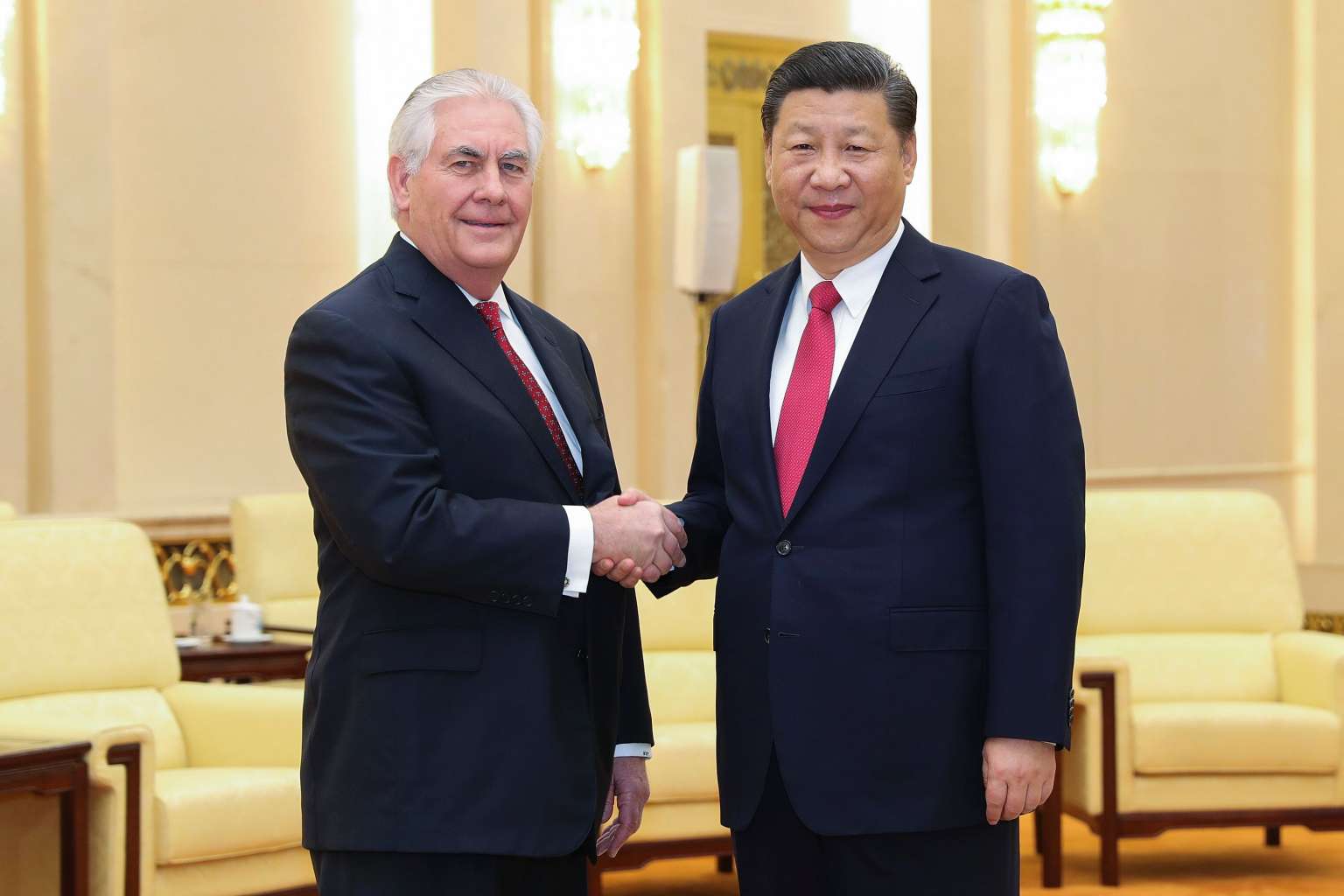US-China still divided on solutions to North Korean nuclear threats: The Korea Herald
Sign up now: Get insights on Asia's fast-moving developments

China's President Xi Jinping (right) shakes hands with US Secretary of State Rex Tillerson (left) before their meeting at the Great Hall of the People in Beijing on March 19, 2017.
PHOTO: AFP
In its editorial on March 19, the paper states that denuclearisation efforts will fail as long as sanctions on North Korea remain porous.
SEOUL (THE KOREA HERALD/ ASIA NEWS NETWORK) - The United States and China remain apart on solutions to North Korean nuclear threats.
US Secretary of State Rex Tillerson and his Chinese counterpart Wang Yi agreed in their meeting on Saturday to work together to stop North Korea from developing nuclear weapons. But they repeated their different positions on solutions.
The US demanded China put stronger pressure on North Korea, while China reiterated its call for both dialogue and negotiations.
A day earlier, Tillerson had said on his visit to Seoul that Washington would not talk with Pyongyang unless it denuclearises and abandons its weapons of mass destruction.
He said the US policy of strategic patience has ended and that it was time to pressure the North, not talk with it. The top US diplomat said 20 years of efforts to denuclearise the North had failed.
According to CNN, the communist state is preparing to test an international ballistic missile that could hit the mainland US. Recent satellite images revealed it was digging a tunnel apparently for an atomic bomb test.
Why efforts to denuclearise North Korea have failed needs to be reviewed.
First, North Korea has no intention to give up its nuclear and missile programme.
Even as it attended six-party talks, the communist state ran a reactor suspected of having produced nuclear weapon materials and conducted a nuclear test.
Now, its leader Kim Jong-un says bluntly it would continue to develop nuclear weapons and ballistic missiles at any cost.
As it nears the ability to deploy nuclear missiles, the North will see no reason to attend any negotiations aimed at making it scrap its nukes.
Secondly, sanctions on North Korea were porous.
China has often opened a back door by which North Korea could avoid punishments.
According to a Voice of America report, 10 North Korean ships entered the port of Longkou in China's eastern Shandong province Thursday after having stayed in international waters for the past three weeks.
It was not clear what they were carrying, but the port had previously been used by North Korean ships to unload coal. The ships appeared to have been held from the port following Beijing's ban on imports of North Korean coal until the end of this year.
A 2016 UN Security Council report said North Korea had traded weapons and other banned items through China-based firms with ties to the North. The report cites dozens of the North's violations, which appeared to be connected with China.
Opening a side door is an act of fooling the international community. China should stop gesturing at slapping on sanctions.
As long as a side door is open, efforts to denuclearise North Korea cannot but fail.
The international community began to tighten its sanctions on the North. Swift, the inter-bank money transfer system, recently cut off the last North Korean banks on the network.
According to news reports, the issue of a US missile shield being deployed in Korea was rarely mentioned in the news conference after talks between Tillerson and Wang.
Wang expressed China's position on the Terminal High Altitude Area Defence system, while Tillerson never uttered mention of Thaad.
It's unclear whether they discussed the matter before the news conference, but it is regrettable the US diplomat did not mention it at the news conference.
Tillerson urged China to refrain from pressure on Korea over the deployment of the system Friday.
Thaad is being installed to fend off nuclear missiles from North Korea, not to spy on China as it argues. Without nukes in the North, the South would have no reason to host the system.
The North should heed the warnings from the tougher US, which is readying punishment with all possible means if its threats cross the red line. Washington is reportedly weighing a pre-emptive strike as an option.
Pyongyang should remember that the US government is resolute against it having nukes, and that if it crosses the red line, it may see the end of its regime.
The Korea Herald is a member of The Straits Times media partner Asia News Network, an alliance of 22 news media entities.


